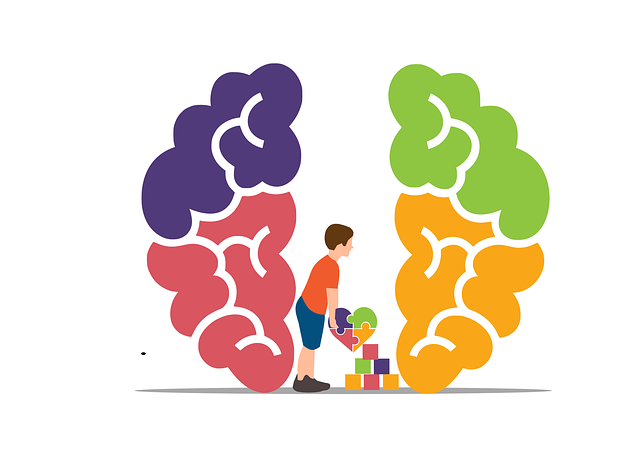En muchas comunidades hispanohablantes, la salud mental sigue siendo un tema tabú debido a barreras lingüísticas y culturales. La terapia para hablantes de español es crucial para superar estas dificultades, proporcionando acceso equitativo a recursos de bienestar psicológico. Estrategias como la construcción de empatía, capacitación en habilidades sociales y programas culturales de coaching empoderan a las comunidades para hablar abiertamente sobre temas de salud mental, desmitificando estigmas. Iniciativas de salud mental culturalmente sensibles, que incluyen terapias en español y capacitación en sensibilidad cultural, crean espacios seguros y accesibles para mejorar la autoestima y relaciones más sanas. Estos programas han ganado tracción, mejorando el acceso a métodos de reducción del estrés y reduciendo el estigma dentro de estas comunidades.
Mental health advocacy plays a vital role in addressing the unique challenges faced by Spanish-speaking communities. This article explores the pressing need for targeted initiatives, focusing on accessible therapy and support services tailored to cultural nuances. We delve into effective strategies for implementing culturally sensitive programs and highlight success stories that demonstrate the profound impact of advocacy. By understanding these efforts, we can foster inclusive mental health environments, ensuring quality care for Spanish-speaking individuals seeking therapy.
- Understanding the Need for Mental Health Advocacy in Spanish-Speaking Communities
- The Role of Therapy and Support Services for Spanish Speakers
- Effective Strategies for Implementing Culturally Sensitive Mental Health Initiatives
- Success Stories: Real-World Impact of Advocacy Programs for Spanish Speaking Individuals
Understanding the Need for Mental Health Advocacy in Spanish-Speaking Communities

En muchas comunidades de habla hispana, la salud mental sigue siendo un tema tabú y malentendido. Esta falta de comprensión puede impedir que los individuos busquen ayuda profesional para problemas emocionales y psicológicos. La terapia para hablantes de español es crucial para abordar estas barreras lingüísticas y culturales, permitiendo un acceso más equitativo a recursos de salud mental. Al ofrecer servicios culturalmente sensibles, se fomenta un ambiente de empatía y confianza, esencial para el bienestar psicológico.
Las iniciativas de defensa de la salud mental en estas comunidades deben ir más allá de la traducción literal. Las estrategias de construcción de empatía, la capacitación en habilidades sociales y el desarrollo de programas de coaching de bienestar mental adaptados culturalmente pueden ser herramientas poderosas. Estas prácticas no solo ayudan a los individuos a navegar por los desafíos únicos que enfrentan, sino que también empoderan a las comunidades para hablar abiertamente sobre la salud mental, desmitificando los estigmas asociados.
The Role of Therapy and Support Services for Spanish Speakers

For Spanish-speaking communities, access to culturally sensitive therapy and support services is paramount in addressing mental health challenges. Many individuals within these communities face unique barriers, including language differences and a lack of available resources tailored to their specific needs. Therapy for Spanish speaking individuals plays a pivotal role in overcoming these obstacles.
Culturally competent therapists who are proficient in Spanish can offer specialized care, providing a safe space for patients to discuss personal struggles and work towards self-esteem improvement. These sessions cater to the unique cultural context, incorporating emotional well-being promotion techniques that resonate with the community. Furthermore, building on the concept of emotional intelligence, therapists help clients navigate complex emotions, fostering healthier relationships and an overall enhanced sense of well-being.
Effective Strategies for Implementing Culturally Sensitive Mental Health Initiatives

Implementing culturally sensitive mental health initiatives requires a deep understanding and appreciation of diverse communities’ unique needs and challenges. For Spanish-speaking populations, ensuring access to therapy for Spanish-speaking individuals is paramount. This can be achieved through specialized services like providing therapists who are fluent in Spanish or offering translation services during sessions. Incorporating cultural elements into therapeutic practices has proven effective, allowing for a more comfortable and accessible environment.
Community outreach programs play a pivotal role in promoting mental health awareness and facilitating access to care. These initiatives can help break down barriers by educating communities about available resources, including crisis intervention guidance tailored to cultural contexts. Additionally, social skills training, adapted to suit diverse backgrounds, can empower individuals with the necessary tools to navigate social interactions and seek support when needed. Effective implementation demands a collaborative approach, involving community leaders, healthcare providers, and local organizations to ensure these programs resonate with and meet the specific needs of Spanish-speaking communities.
Success Stories: Real-World Impact of Advocacy Programs for Spanish Speaking Individuals

In recent years, mental health advocacy initiatives targeting Spanish-speaking communities have gained significant traction, offering a glimmer of hope for those who previously had limited access to support. These programs have proven successful in tackling the unique challenges faced by Spanish-speaking individuals, who often face language barriers and cultural misunderstandings when seeking therapy. By providing specialized services and resources, such initiatives are making mental health care more inclusive.
Success stories from across the nation highlight the profound impact of these advocacy programs. For instance, community-based organizations have developed innovative solutions like bilingual therapy sessions, cultural sensitivity training for healthcare providers, and targeted outreach campaigns. These efforts have led to increased awareness, reduced stigma, and improved access to evidence-based Stress Reduction Methods and Stress Management techniques within Spanish-speaking populations. As a result, more individuals are not only seeking help but also finding it, marking a significant milestone in the ongoing Mental Health Policy Analysis and Advocacy for equitable mental well-being.
Mental health advocacy initiatives focused on Spanish-speaking communities are vital to addressing the unique challenges faced by this demographic. By providing accessible therapy and support services tailored to cultural sensitivities, we can significantly improve mental well-being outcomes. Effective strategies, as highlighted in this article, emphasize the importance of community engagement, educational programs, and culturally competent care. The success stories shared demonstrate that these initiatives not only enhance individual lives but also foster stronger, more resilient communities. Advocating for and investing in therapy for Spanish-speaking individuals is a crucial step towards creating a more inclusive and supportive society.














